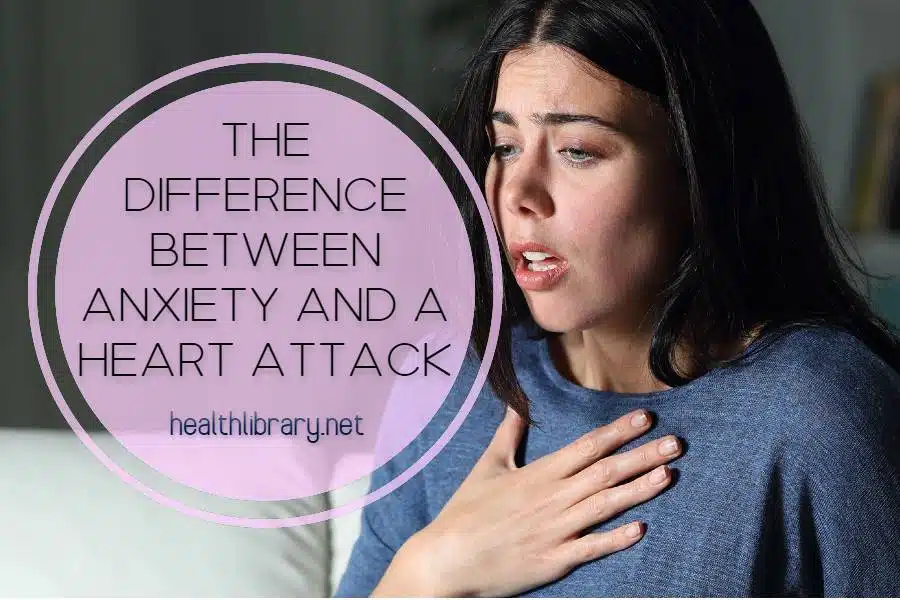Anxiety feels like a heart attack: a tightness in the chest, heat radiating from your brow, palms sweating and trembling with fear. Your breathing starts to become shallow and rapid as if you just ran a marathon and your heart skips beats or races at an uncontrollable speed. The emotions that sweep through you can feel overwhelming, paralyzing even, and it seems like there is no escape; that whatever nightmare has hold of you won’t let go until it’s drained every last bit of energy you possess. It can be a terrifying experience but knowing that it will eventually pass is the only thing keeping hope alive in such a seemingly hopeless situation.

the Symptoms of Anxiety and a Heart Attack
When attempting to differentiate between anxiety and a heart attack, it is important to be mindful of your body’s physical symptoms. Anxiety can cause chest pain, shortness of breath, perspiration, and lightheadedness.
In contrast, a heart attack may present with more intense chest pain, which may feel like squeezing or pressure. Additionally, heart attacks may be accompanied by excessive sweating, nausea, and jaw pain.
Being aware of these key distinctions can help ensure that you receive the appropriate medical assistance in either situation.
Read: Warning Signs You Should Know About for Addison’s Disease In Dogs
Identifying Risk Factors for Selected Cardiac Conditions
When trying to differentiate between anxiety and a heart attack, it is essential to understand the risk factors associated with cardiac conditions.
These risk factors can vary from person to person and may include age, family history, gender, smoking habits, inactivity, and being overweight.
Furthermore, any pre-existing medical conditions such as diabetes, high cholesterol, or atrial fibrillation can also be potential risk factors.
To ensure that your doctor can accurately assess the cause of your chest pain, it is important to inform them of any current medications you are taking or diagnosed illnesses.
Understanding the Signs and Symptoms of an Anxiety Attack
Anxiety attacks can often present similarly to a heart attack, but the signs and symptoms you experience will typically differ.
Common symptoms of an anxiety attack include sweating, numbness or tingling sensations, feeling like your heart is racing, chest pain, and difficulty breathing.
These physical responses are usually caused by fear or stress; however, if you experience any of these symptoms, it is best to seek medical attention to determine the source of your discomfort.
Learning to Manage Your Stress Levels To Avoid Chest Pains
If you have experienced chest pains that are unrelated to a medical condition, it is important to learn how to manage your stress levels.
Regular exercise, meditation, and deep breathing exercises are all effective methods for managing your stress levels.
Additionally, it can be beneficial to identify situations that cause anxiety and create strategies for addressing them in order to prevent any physical manifestations of your feelings.
When You Need Emergency Medical Attention?
If you are ever uncertain or unsure whether your chest pain is due to anxiety or a heart attack, it is important to seek immediate medical attention.
You should especially consider going to the emergency room if you experience heavy sweating, nausea, dizziness or lightheadedness, pressure in your jaw and arm area, or shortness of breath along with the chest pain.
All of these signs can indicate a medical emergency, so getting an evaluation from medical professionals can give you the assurance that you need.
How much anxiety is normal?
It is normal to experience some level of anxiety in response to certain situations or events.
However, excessive or chronic anxiety that interferes with daily functioning may be a sign of an anxiety disorder.
It can be difficult to determine exactly how much anxiety is too much, as it can vary from person to person.
It is important to consult with a mental health professional to determine if your level of anxiety is within a normal range or if it requires treatment.
How much anxiety is too much?
It can be difficult to determine the extent to which anxiety is too much, as it can vary from person to person.
Generally speaking, if your anxiety is excessive or chronic and is interfering with your daily life, it may be indicative of an anxiety disorder.
Some signs that your anxiety may be excessive or problematic include: difficulty controlling your worry or anxiety, avoiding certain situations or activities due to anxiety, experiencing intense anxiety for extended periods of time, physical symptoms such as headaches, muscle tension, or difficulty sleeping as a result of anxiety, difficulty concentrating or completing tasks due to anxiety, and feelings of hopelessness or helplessness related to anxiety.
If you are concerned about your level of anxiety, it is recommended to consult with a mental health professional, who can help you determine if your level of anxiety is within a normal range or if it requires treatment.
How many suffer from anxiety?
Anxiety disorders are among the most prevalent mental health conditions, with the National Institute of Mental Health (NIMH) estimating that 19.1% of adults in the United States (or around 44 million people) experience an anxiety disorder in any given year.
Furthermore, anxiety disorders are also common among children and adolescents, with an estimated 31.9% of those aged 13 to 18 having experienced an anxiety disorder at some point in their lives.
It is important to note that these figures may be underestimated, as many individuals with anxiety disorders may not seek treatment.